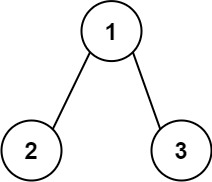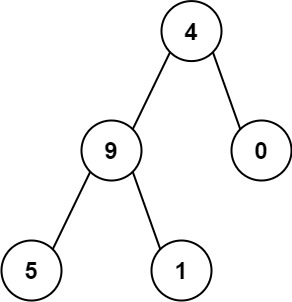티스토리 뷰
Algorithm/LeetCode
[LeetCode - Daily Challenge] 129. Sum Root to Leaf Numbers
Jaime.Lee 2021. 11. 3. 18:01Problem
You are given the root of a binary tree containing digits from 0 to 9 only.
Each root-to-leaf path in the tree represents a number.
For example, the root-to-leaf path 1 -> 2 -> 3 represents the number 123.
Return the total sum of all root-to-leaf numbers. Test cases are generated so that the answer will fit in a 32-bit integer.
A leaf node is a node with no children.
Example 1:

Input: root = [1,2,3]
Output: 25
Explanation:
The root-to-leaf path 1->2 represents the number 12.
The root-to-leaf path 1->3 represents the number 13.
Therefore, sum = 12 + 13 = 25.Example 2:

Input: root = [4,9,0,5,1]
Output: 1026
Explanation:
The root-to-leaf path 4->9->5 represents the number 495.
The root-to-leaf path 4->9->1 represents the number 491.
The root-to-leaf path 4->0 represents the number 40.
Therefore, sum = 495 + 491 + 40 = 1026.Constraints:
- The number of nodes in the tree is in the range [1, 1000].
- 0 <= Node.val <= 9
- The depth of the tree will not exceed 10.
Solution
0~9로 이루어져있는 이진트리의 루트노드에서 리프노드까지를 하나의 숫자로 구성할 때 모든 구성 가능한 숫자의 합을 구하는 문제입니다.
루트에서 리프노드까지 탐색한 뒤 마지막 리프노드를 제거하고 다음 리프노드를 추가하는 식으로 백트래킹을 이용해 풀 수 있습니다.
package io.lcalmsky.leetcode.sum_root_to_leaf_numbers;
import io.lcalmsky.leetcode.TreeNode;
import java.util.ArrayList;
import java.util.List;
import java.util.stream.Collectors;
public class Solution {
public int sumNumbers(TreeNode root) {
if (root == null) {
return 0;
}
List<List<TreeNode>> lists = new ArrayList<>();
List<TreeNode> treeNodes = new ArrayList<>();
treeNodes.add(root);
getRootToLeafNodes(lists, treeNodes, root);
return lists.stream() // (4)
.map(tnl -> tnl.stream()
.map(tn -> tn.val)
.map(String::valueOf)
.collect(Collectors.joining()))
.map(Integer::valueOf)
.reduce(Integer::sum)
.orElse(0);
}
private void getRootToLeafNodes(
List<List<TreeNode>> lists, List<TreeNode> treeNodes, TreeNode node) {
if (node.left == null && node.right == null) { // (1)
lists.add(new ArrayList<>(treeNodes));
}
if (node.left != null) { // (2)
treeNodes.add(node.left);
getRootToLeafNodes(lists, treeNodes, node.left);
treeNodes.remove(treeNodes.size() - 1);
}
if (node.right != null) { // (3)
treeNodes.add(node.right);
getRootToLeafNodes(lists, treeNodes, node.right);
treeNodes.remove(treeNodes.size() - 1);
}
}
}- 재귀 호출의 escape case로 현재 노드가 리프노드일 때 추가한 노드의 리스트를 전체 리스트에 추가해 반환합니다.
- 현재 노드의 left 노드를 추가하고 재귀호출을 합니다. 끝나면 마지막에 추가한 노드를 리스트에서 제거합니다.
- 현재 노드의 right 노드를 추가하고 재귀호출을 합니다. 끝나면 마지막에 추가한 노드를 리스트에서 제거합니다.
- 중첩 리스트에서 안쪽에 리스트를 문자열로 바꾼 뒤 다시 숫자로 바꿔 전체 합을 구해 반환합니다.
Test
package io.lcalmsky.leetcode.sum_root_to_leaf_numbers;
import static org.junit.jupiter.api.Assertions.assertAll;
import static org.junit.jupiter.api.Assertions.assertEquals;
import io.lcalmsky.leetcode.TreeNode;
import org.junit.jupiter.api.Test;
class SolutionTest {
@Test
void givenTreeNode_whenSumRootToLeaf_thenCorrect() {
assertAll(
() -> test(TreeNode.of(1, 2, 3), 25),
() -> test(TreeNode.of(4, 9, 0, 5, 1), 1026)
);
}
private void test(TreeNode given, int expected) {
// when
Solution sumRootToLeafNumbers = new Solution();
int actual = sumRootToLeafNumbers.sumNumbers(given);
// then
assertEquals(expected, actual);
}
}'Algorithm > LeetCode' 카테고리의 다른 글
| [LeetCode - Daily Challenge] 122. Best Time to Buy and Sell Stock II (0) | 2021.11.11 |
|---|---|
| [LeetCode - Daily Challenge] 404. Sum of Left Leaves (0) | 2021.11.05 |
| [LeetCode - Daily Challenge] 130. Surrounded Regions (0) | 2021.11.01 |
| [LeetCode - Daily Challenge] 994. Rotting Oranges (0) | 2021.10.29 |
| [LeetCode - Daily Challenge] 15. 3Sum (0) | 2021.10.29 |
댓글
공지사항
최근에 올라온 글
최근에 달린 댓글
- Total
- Today
- Yesterday
링크
TAG
- JSON
- Linux
- 함께 자라기 후기
- JPA
- spring boot app
- leetcode
- 스프링 부트
- 스프링 부트 튜토리얼
- QueryDSL
- spring boot jwt
- 클린 아키텍처
- proto3
- 스프링 부트 애플리케이션
- 스프링 데이터 jpa
- Spring Boot JPA
- 함께 자라기
- Spring Data JPA
- gRPC
- Java
- 알고리즘
- intellij
- @ManyToOne
- Jackson
- Spring Boot
- 헥사고날 아키텍처
- Spring Boot Tutorial
- 스프링 부트 회원 가입
- 스프링부트
- r
- spring boot application
| 일 | 월 | 화 | 수 | 목 | 금 | 토 |
|---|---|---|---|---|---|---|
| 1 | 2 | 3 | ||||
| 4 | 5 | 6 | 7 | 8 | 9 | 10 |
| 11 | 12 | 13 | 14 | 15 | 16 | 17 |
| 18 | 19 | 20 | 21 | 22 | 23 | 24 |
| 25 | 26 | 27 | 28 | 29 | 30 | 31 |
글 보관함
